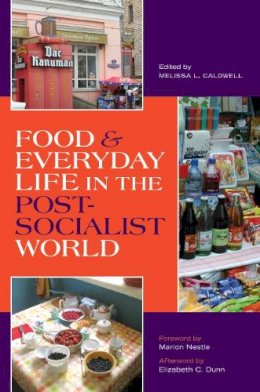
Food and Everyday Life in the Postsocialist World
Melissa Caldwell
Across the Soviet Union and eastern Europe during the socialist period, food emerged as a symbol of both the successes and failures of socialist ideals of progress, equality, and modernity. By the late 1980s, the arrival of McDonald's behind the Iron Curtain epitomized the changes that swept across the socialist world. Not quite two decades later, the effects of these arrivals were evident in the spread of foreign food corporations and their integration into local communities. This book explores the role played by food—as commodity, symbol, and sustenance—in the transformation of life in Russia and eastern Europe since the end of socialism. Changes in food production systems, consumption patterns, food safety, and ideas about health, well-being, nationalism, and history provide useful perspectives on the meaning of the postsocialist transition for those who lived through it.
Product Details
About Melissa Caldwell
Reviews for Food and Everyday Life in the Postsocialist World
Anthropology of East Europe Review
No advanced students or scholars of the social sciences concerned with globalizing topics and post-socialist states should miss the opportunity to examine this book. . . . We are fortunate to have such a worthy contribution to food studies and Eurasian anthropology.Vol. 70.2, April 2011
The Russian Review
By illuminating the ways in which people previously living under state socialism have variously responded to new food markets and regulatory regimes, this volume constitutes an important contribution to post-socialist studies and to the anthropology of food.#16 2010
Jakob A. Klein
School of Oriental andAfrican Studies
The authors of Food and Everyday Life provide a text that is rich in historical and cultural context and that examines the interactions of the regular people of the old Soviet states in ways that are convincing, thorough, and otherwise mind-blowing. Winter/Spring 2010
Counterpoise
[This] book is thought-provoking, a pleasure to read, and an important contribution to studies of the globalization of postsocialist states and to food studies. 47.1 2013
Canadian-American Slavic Studies
Taking us from Moscow coffeehouses to the practice of pickling vegetables in the kitchens of urban Sofia, the authors each employ the ethnography of the mundane to question not only ideal-type models of 'transition', but also the hegemony of novel, neoliberal forms of governance. This is anthropology at its best, combining the rich, 'thick description' of the everyday concerns of ordinary citizens with a rigorous treatment of issues of power, policy and social inequality.
Slavonica
[E]ach essay in this collection is exceptionally well written and thoroughly researched. In its unique look at how food practices have reflected and responded to the transition from the socialist past to the capitalist present, this collection provides a valuable contribution to the ongoing academic debates about the Europeanization and globalization of the countries of the former Soviet bloc.
Slavic and East European Journal
